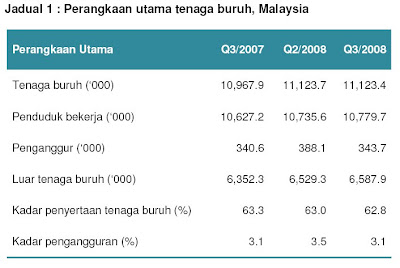The Sun
Himanshu Bhatt
GEORGE TOWN (March 30, 2009) : Penang has become the first state in the country to eradicate hardcore poverty by arranging financial aid and economic activities for all 726 households registered under the hardcore poor category.
Chief Minister Lim Guan Eng said the initiative was successful partly because of the support of the private sector and social groups who chipped in to aggressively alleviate the hardships of the poor.
"Even though it is difficult, including facing bankruptcy, I am more willing to have the state becoming bankrupt to help the poor and be burdened than to be bankrupted by corruption," he said today.
The implementation mechanism, overseen by the Welfare Department, consists mainly of funding affected families to ensure their incomes are topped up such that they get at least RM500 every month. The department even helped some individuals set up bank accounts to receive the funds.
Lim said checking the state's poverty rate was one of the first things that he had given priority to after Pakatan Rakyat took control of the government in March last year. The state then took a whole year to conduct an exhaustive survey, with the help of socio-economic specialists from Universiti Sains Malaysia, to determine the exact number of hardcore poor. The figures are updated every three months, Lim said, adding that the state was planning to now eradicate general poverty as well, which is classified as income below RM700 a month.
Lim also said a total of RM2.2 million had been collected from the private sector, including philanthropists and charitable businesses, under an initiative called "Partners Against Poverty".
Lim said this in a ceremony to announce the successful eradication of hardcore poverty in Dewan Sri Pinang here. He also questioned what happened to a reported RM1.1 million allocation under the Rural and Regional Development Ministry to help 22 hardcore poor in Penang. Penang Health, Welfare, Caring Society and Environment Committee chairman Phee Boon Poh rebuked Women, Family and Community Development Minister Datuk Dr Ng Yen Yen for rejecting the state’s plea for funding to build a housing complex for about 300 homeless people.
Ng reportedly said the state should fund the complex by itself since the project was its own initiative.
-------------------------------------------------------------------------------------------------------------------------------------------
On one hand I am happy for the Penang hardcore poor for such a magnificent effort to address their problems within a period of little over a year. This is consistent with Lim Guan Eng's suggestion that money from Petronas can be pumped straight into the hands of the needy rather than channelled through a few main contractors then sub-contractors then foreign labourers then hardware dealers (provided the projects were actually completed). Like Nizar's administration in Perak, there is a swift solution to age-old problems.
On the other hand, I just hope that the CM can tone down a bit on the rhetoric. He need not be in GE mode now, does he? If he rather bankcrupt the State Government, then that would have huge implication on the staff on its payroll and all Penangites (rates paying or dodging regardless) depending on the proper functioning of the state government.
There should also be audited accounts for the receipt and application of the funds concerned. The CM should, consistent with his CAT philosophy, make the modus operandi of the scheme known to all. That'll be nice publicity and also let people in need to get in touch with the right channel. Some feedback from the recepients could give credibility to the CM's claim.
Anyway, I did a quick computation. 726 families @RM500 per month = RM363,000 per month hence RM4,356,000 per year. Donate a semi-detached house a month and you save over 700 hundred families. That shows the income gap between the downright have nots; and the haves a lot.
However, one figure is missing. How many of each household have? RM500/2= RM250 per head or RM500/10 = RM50 per head. Perhaps durex could donate some of their grade C products to aid combating abject poverty.
By the same token, Atlantuya was reported of asking form USD500,000 for whatever she did. That cums to RM1.8million or 4.96 months for the above exercise. If that report is true then that's one heck of price to pay.



















